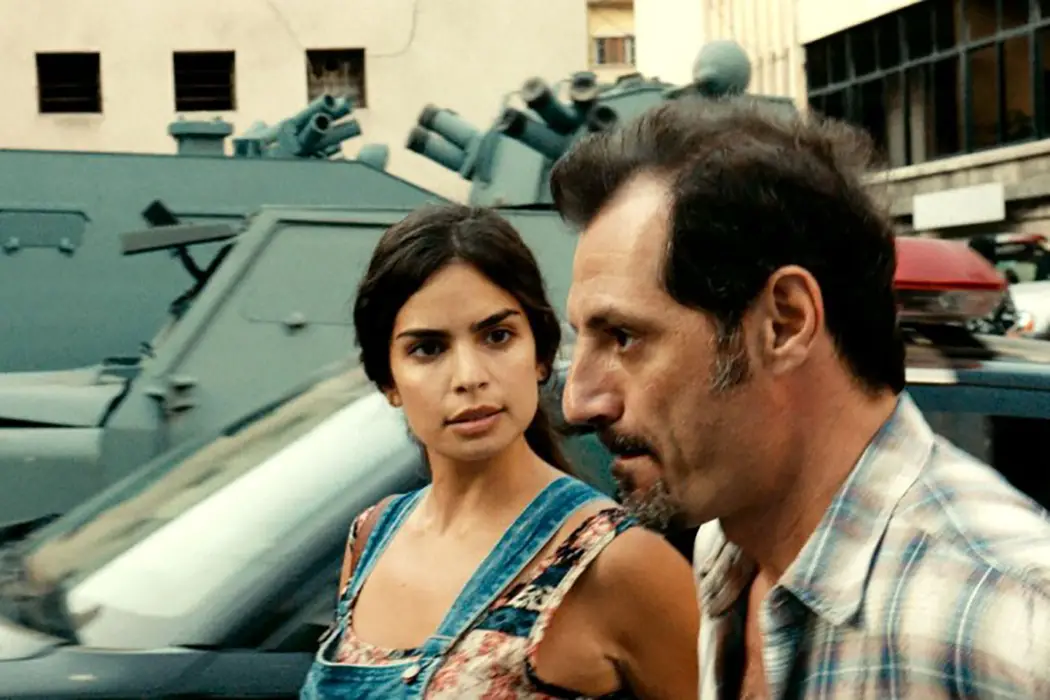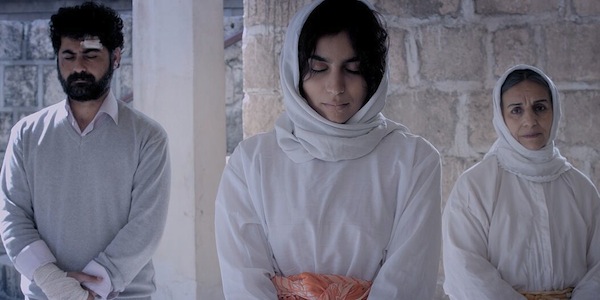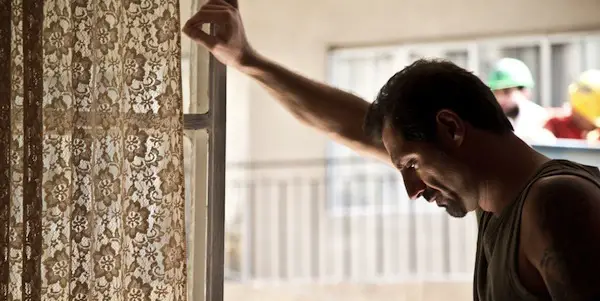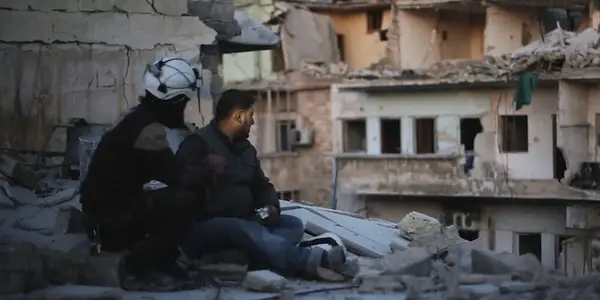Jacob Burns Film Center Announces Line-Up For Contemporary Arab Cinema: An Interview With Series Programmer, Lina Matta

Sophia Cowley is a young writer, yogi, feminist and film…
From September 22nd to 28th, the Jacob Burns Film Center will host its 6th annual Arab Film Series, aptly named Contemporary Arab Cinema. In light of the current political climate, this series is likely to be a popular one. Many of the films center on cultural conflicts: Muslims vs. Christians, religious extremists vs. moderates, and Syrians vs. Lebanese, to name a few. Located in Pleasantville, NY, under an hour by train to Manhattan, the JBFC is the go-to place for film buffs in Westchester County and beyond.
Lina Matta, six-time programmer of Contemporary Arab Cinema, is the Senior Channel Manager of the Middle East Broadcast Company (MBC channels 2,4, Max, and Variety). Lina is a Lebanese-American based in Dubai whose cultural and professional backgrounds merge to make her the best choice for this series.
On opening night, the theater will screen The Insult, the second film by Lebanese filmmaker and cinematographer, Ziad Doueiri. This tense drama exposes the ever-present divide between a Palestinian and a Christian in post-civil war Lebanon. (Side note: Doueiri got his start in the film industry as a first camera assistant on Quentin Tarantino’s Reservoir Dogs, Pulp Fiction and Jackie Brown.)
We reached out to Lina over email to inquire about the upcoming Contemporary Arab Cinema series.

Sophia Cowley for Film Inquiry: How did you first get connected with the Jacob Burns?
LM: I was living in DC and working on a documentary about nursery prison programs. Westchester had two, so I moved to be closer to the Taconic Correctional Facility and continue working on the documentary.
I’ve always been a huge film buff and had to trek to the city for my film habit. When the Burns opened, I was one of its first and most frequent “customers.” The programming was amazing and I especially loved their series which delved into more global issues.
I saw an opportunity for the Arab and North Africa region which seemed underrepresented. Approached Brian Ackerman, JBFC Programming Director, who was very open to the idea. A year later, in 2012, the ANA Contemporary Arab Cinema series was born.
This year’s films seem to play on themes like patriarchal oppression, family ties and religious clashes. How closely do these stories reflect Arabic culture and life?
LM: There are 22 Arab countries, with approximately 422 million inhabitants, who in addition to Arabic, speak about 20 minority languages. It’s tough to generalize. The films exemplify the rich tapestry of cultures and religions that are the middle east, from deeply religious conservative towns to extremely liberal cities.
Mohamed Diab‘s film, The Clash embodies that – the entire film takes place in the back of a police van. As police start arresting demonstrators from Tahrir Square, one gets a sense of the wide divide in this cross section of Egyptian society.
It’s in our nature to tell stories.

Where does the importance of international film and education come into play in Trump-era America? Why is this year an especially significant time to attend a series like Contemporary Arab Cinema?
LM: It’s as important today as it was 5, 10, 50 years ago. International film and education are, and always will be needed. As with individuals, misunderstandings are common and blaming “The Other” for all ills is a lot easier than actually understanding them.
The audience should come, every year, because Arab directors are making amazing films that won’t come to “a theater near you”. It’s in our nature to tell stories. In cultures of the Middle-East, a Hakawati, i.e. storyteller, “played a central role in society, drawing crowds, telling tales, with great wit, wisdom, poise, and expression.”
Today’s directors are modern-day Hakawatis, they reveal aspects of societies that don’t [make] the front pages of the New York Times. And, like all the best American directors, the stories they tell deepen our understanding of ourselves and of others.
What do you hope audiences will take away from this year’s series?
LM: The aim of this series is to shed the exoticism of “The Arab.” Our stories are universal, our reactions commonplace. We are the product of our time and our geography. We react in ways that might not be understandable on the surface, but are very much so, once you start scratching. Ziad Doueiri’s Opening Night film, The Insult, for example, depicts how what may seem like a small incident, blown way out of proportion, reveals, as the film unravels, the baggage of history and personal injury both characters bring to the table.
Our stories are universal, our reactions commonplace. We are the product of our time and our geography.
Which films or events are you most excited about and why?
LM: That’s always my least favorite question. I’ve hand-picked each of the films because each adds a piece to the puzzle. They are all fantastic films. There are films for those who want to laugh (Solitaire), those in the mood for a love story (Hedi) or a road trip to self-discovery (Tramontane). For more serious fare, [there’s] The Dark Wind (a woman kidnapped by ISIS returns to her village), Last Men in Aleppo (Syria’s White Helmets saving others, but can they save themselves), and Ghost Hunting (a former political prisoner comes to terms with his torturers by reenacting his experience).
For a political murder mystery thriller, watch The Nile Hilton Incident; for an inside look into the power of TV preachers in a city reeling from the repercussions of the Arab spring, get tickets for Mawlana. For the Arab-Israeli version of Sex and the City in Tel Aviv watch In Between, and for a trip to the Egyptian “Hamptons,” sample Before the Summer Crowds.

This year’s series is set to feature several premieres: The Dark Wind, the first narrative feature-length film to cover the Yazidi genocide, makes its North American premiere on September 25th. And on September 26th, Tramontane will make its US premiere. The film is a Lebanese tale of a blind man in search of his identity in the land that seems as lost as he is.
In Between, the debut film from Palestinian director, Maysaloun Hamoud, will see its Westchester County, NY premiere on September 23rd; Solitaire, the culture-clashing comedy from Lebanon, will premiere in New York on the 23rd as well. Three other New York premieres are in store for this year’s Contemporary Arab Cinema: The Preacher on September 24th, Ghost Hunting on the 27th and Hedi on the 28th.
Will you attend any of the screenings at this year’s Contemporary Arab Cinema? Let us know which films you are looking forward to in the comments below!
For more information and to check out this year’s line-up for the JBFC’s Contemporary Arab Cinema Series, visit the theater’s website here.
Does content like this matter to you?
Become a Member and support film journalism. Unlock access to all of Film Inquiry`s great articles. Join a community of like-minded readers who are passionate about cinema - get access to our private members Network, give back to independent filmmakers, and more.
Sophia Cowley is a young writer, yogi, feminist and film enthusiast from NY. Her idols include Miranda July, David Lynch and Abraham Lincoln. She runs the blog www. isthisthereellife.wordpress.com.












